- Home
- Thomas Pynchon
Mason & Dixon Page 16
Mason & Dixon Read online
Page 16
Be the Instrument brazen, or be it Fleshen,
[Maskelyne sings, in a competent Tenor]
Star-Gazing’s ever a Whore’s profession,—
(Isn’t it?)
Some in a Palace, all Marble and Brick,
Some behind Hedges for less than a kick, tell me
What’s it matter,
The Stars will say,
We’ve been ga-zing, back at ye,
Many a Day,
And there’s nothing we haven’t seen
More than one way,
Sing Deny o deny o day . . .
[Recitative]
Now some go to Bath, where, like candle and Moth, even men of the Cloth seek them out. Whilst others run Pitches where diggers of Ditches may scatter their Riches about. Tho’ the tools of their Trade may be differently made, for their Arts they are paid, all the same,— ’Pon Astronomer’s Couch or Coquette’s, all avouch, ’tis a reckless Debowch of a Game. . . .
There are Stars yet to see,
There are Planets hiding,
Peepers are we, with a Lust abiding,
Some style it ‘Providence,’
Others say, ‘God,—
Some call it even, and some call it Odd,
Yes but what’s it matter,
The Stars will say,
&c.
“We’ve a while before Sirius,—” Maskelyne flush’d with Song, “what say I do yours now, and you do mine later?”
“What?” Mason begins to edge toward the Tent opening.
“Your natal Chart, Mason. Have you ever had it done?”
“Well . . .”
“It’s all right, neither have I,— perhaps most Lens-folk would rather not know. But as we’re old Charlatans together, maroon’d here in this other-worldly Place, and withal sharing the same Ruling Planet,— rather, Goddess,— to whose least sigh we must attend, or risk more than we ought,— eh?”
Mason blinks. Is it the Altitude? Hardly do to get into a Kick-up with Clive of India’s brother-in-law, he supposes. Hey? What if this isn’t Insanity? and no worse than the frantic chumminess of Exile. . . . Ahrrh, yet suppose, more harshly, that ’tis Bradley whom Maskelyne wishes to snuggle up to,— Mason having run into any number of amateur Star-gazers with the same ideas about access to the A.R.,— back Home, ’twas possible to wave them Adieu till they be absorb’d back into the human Nebulosity of the Town,— but here in a Tent in the middle of the 360-degree Ocean,— what choice does he have?
“Date of Birth?”
“Don’t know. They had me baptiz’d May Day, and that’s the day I mark.”
“So you were born some weeks earlier, perhaps in Aries, even Pisces. . . . Less probably, in Taurus, yet,—” he is giving Mason the heavy O.O.
“If it’s helpful, I am told that of the Qualities observ’d in my comportment, those of the classick Taurean prevail,— Persistent, Phlegmatick, Provok’d only with great difficulty,— our Passion of Titanick Scope, our Fate, ever to be prick’d at by small men in spangl’d Costumes.”
“First of May, then, shall we?” So Maskelyne goes to work. By Dark-Lanthorn-Light, his face a-glimmer and smooth as wax, whilst the Sea crashes up to them past the baffling of vertiginous Peaks and Ravines, he pencils out a Wheel, and begins to fill it with Glyphs and Numerals. At one point, as if without thinking, he reaches back and releases his Queue, and hair swings forward to either side, curtaining him and his bright eyes with the calculations. Soon he is passing wordless remarks such as “Hmm!” and “Yaacch!”,— Mason beginning to huff somewhat, feeling like a Model to whom an Artist is making cryptic Suggestions. “There,” says Maskelyne at last. “Will ye look at all those Venus aspects . . . La, la, la. . . . Where’s that Mountain, again?”
“You’re right, after all, I’d rather not know. Sorry to’ve put ye to all this trouble,— ”
“First of all, doesn’t it seem odd, that you and Mr. Dixon, with your natal signs rul’d by Venus and the Sun respectively, should have lately, as partners, observ’d the conjunction of those very two bodies,— the Event occurring, as well, in the Sign of the Twins?”
Shrugging, “Chance of a Sun ruler, one in twelve. Chance of a Venus ruler, two in twelve,— Chance of the Pair, two in one hundred forty-four,— a Coincidence appealing, yet not overwhelming.”
“Yet as Odds,— say, upon a Race,— ”
Tho’ it takes Mason a while to recognize it, Maskelyne has been trying to convey the Dimensions of his Curiosity. As a man of Religion, he has often enough sought among the smaller Probabilities for proofs of God’s recent Attendance, has practis’d Epsilonics for the sake of stronger Faith, as what deep-dyed Newtonian would not? One in seventy-two, or point zero one four, is not a figure he can be quite comfortable with. ’Tis not quite Miraculous enough, there’s the very Deuce of it. And if not quite a clear Intervention by the Creator, not quite from Heaven, then what Power is this an Act of?
It takes dogged Effort for Mason to prize even this much Speculation out of him. Yet what else after all is there to do in this miserable Place, but smoke Pipes and discuss God,— as newly met guests at some Assembly might discuss a common Acquaintance but lately withdrawn?
“Your natal Jupiter lies in Gemini,— the very Sign in which the late Transit occurr’d, of which you Lads made that very fine Ob. Traditionally, Wealth from Collaboration,— yet both Mercury and Venus are in Aries,— possibly your Natal Sign,— favoring Independence, Leadership,— and both lie blessedly Sextile to your Moon in Aquarius . . . humane, inclin’d to Science, a devotee of Reason . . . ’tho squar’d by your Sun of course. . . .” He has fallen into a kind of mystickal Bustling, like a Gypsy at the Fair. “But dear oh dear, not much sign of Mr. Dixon at all . . . nothing closer than your Mars in Virgo, standing two and a half Degrees in from the Cusp with Leo, suggesting you make him a truculent and wary neighbor.” His shiny-eyed, vixenish Phiz peering out of all that loose Hair.
“You take a deep Interest in Mr. Dixon?”
A Parsonickal spread of Hands. “Shallow curiosity, Sir,— the amateur Observer’s Curse. Yet, now ye’ve rais’d it,— have there been others, who . . . have taken an Interest in him? Who can they be,— and what may they expect?”
“Well. It can’t be the Honorable E.I.C., can it? Or you’d know. Wouldn’t you.”
“As much as you. There being the fitful Rumor that your Mr. Peach will be nam’d a Director.”
“As well as a Long-Establish’d Truth,” Mason, later, will fear he snapp’d back, “that your Lord Clive may have anything he damn’d wishes. What of it? Any repayment I may owe Sam Peach, is many orders of Magnitude beneath the Arrangements proper to,—” pausing to deepen his Voice, “Clive,— of In-dia,”— Mason having found that inflecting the Name thus, whilst reliably nettling Maskelyne, also seems strangely to amuse him.
“We are quite the Pair, then,— that is, I presume,” peering at Mason, “both Subjects of the same Invisible Power? No? What is it, think ye? Something richer than many a Nation, yet with no Boundaries,— which, tho’ never part of any Coalition, yet maintains its own great Army and Navy,— able to pay for the last War, as the next, with no more bother than finding the Key to a certain iron Box,— yet which allows the Britannick Governance that gave it Charter, to sink beneath oceanick Waves of Ink incarnadine.”
“Bless us!” Mason cries. “Another Riddle! Hold, permit me to guess. . . .”
“Or perhaps, like our Tapster, you entertain Fancies, as to my relations with Lord Clive. Splendid! Out of Dark Policy do I encourage it in all, as little as object to it,— yet the Truth is so drab, Mason, indeed, since Peggy and he return’d, I’ve been to Berkeley Square but once, not seen them above thrice more,— ever in Company, certainly not in Private. Clive and I do not play Whist together, nor in Disguise haunt the Snare
s of Ranelagh,— he did not bring me back a jewel’d Telescope, nor am I his Connection in London for the purchase of Opium. Seldom if ever does he, upon the least movement of my Eyebrow, rush forward insisting I take Waggon-Loads of Oriental Treasure.”
“Being the very least I should’ve expected,— what are Brothers-in-law for? Perhaps, wishing any Gifts to you to be appropriate, he yet remains unclear as to the Range of your Interests.”
“He’s not yet ready to make use of me, that’s all. Someday he must . . . I’ve been paid for . . . it shan’t cost him anything.” Maskelyne’s Phiz, with its one-sided smile and wary eyes and need for Complicity, would not have grown this cautious, had some blows not already landed. Whatever his Bargain, he is not happy with it. Mason, who as yet hasn’t seen the terms of his own, is but apprehensive.
“Here we are,” Maskelyne plaintively, “Englishmen in the bloom of Sanity, being snatch’d away, one by one, high and low, ev’ryday, like some population of distraught Malays waiting for the call of Amok,— going along, at what we style Peace with the Day,— all at once, Bang-o! another ’un out in the Street waving the old Krees,— being British of course, more likely a butter-knife or something,— yet with no Place, no Link upon the Great Chain, at all safe,— none however exalted,— no and that is why I fear so, dear Colleague, for my sister, and for the great Soldier whose Fate is hers . . . ,” peering out now from a burrow of Anxiety, dug one long sour midwatch upon the next.
Mason has no way to tell how deliberate this is. Maskelyne, as all London, has known about Clive’s use of Opium,— yet what Comfort can Mason give him? Such things have ended badly before,— whilst Maskelyne has ever presented an Enigma. Long before they met, Mason felt his sidling Advent, cloak’d as by Thames-side Leagues of Smoke and Mists. At last,— at first,— he saw the introductory Letter, as Dr. Bradley in the Octagon Room brought it fretfully to and fro, muttering, “Damn difficult to make out, seems to be instructing me in the matter of Lunar Distances,— yet somehow I can’t quite . . . here, see if you can make any sense,—” letting go of it, allowing the document to flutter Earthward faster than Mason could dive to catch it, and disappearing toward the Observers’ Kitchen.
At first, and then upon re-reading, he could make no more sense of the Letter than Bradley had done. One of Mason’s chores as Assistant was to review just such Correspondence. Since the Longitude Act of 1714, which offer’d Prizes up to twenty thousand Pounds for a reliable way to find the true Longitude at Sea, the Observatory had become a Target for Suggestions, Schemes, Rants, Sermons, full-length Books, all directed to Bradley’s Attention, upon the Problem of the Longitude. Though some were cagy, hinting at Amazing Simplicity and Ingenious Devising, whilst giving no details, most of the letters were all-out philosophick confessions, showing either an unhealthy naïveté, or an inner certainty that the Scheme would never work anyway. For many, it was at least a chance to Rattle at length to a World that was ignoring them. Others were more passionate as to the worth of their Inventions, though employing Arts more of the Actor-Projector than of the Geometer. Occasionally Insanity roll’d a sly Eye-ball into the picture. Treatises on “Para-geography” arriv’d, with alternative Maps of the World superimpos’d upon the more familiar ones. Many,— as had the elder Cabot upon his deathbed,— claim’d to’ve been told the Secrets of the Longitude by God (or, as some preferr’d, Thatwhichever Created Earth and her Rate of Spin). Others told of Rapture by creatures not precisely Angels, nor yet Demons,— styl’d “Agents of Altitude.” That they were taken aloft and shewn the Earth as it appear’d from the Distance of the Sun, and that the Navigator of the Vessel us’d a kind of Micrometer, whose Lines were clapp’d to the Diameter of the Earth, and that the measuring device read 8.75 seconds of Arc, “not in our numbers of course, not until accurately transnumerated, from theirs.— More than happy to share details of this toilsome Conversion, upon duly authorized request.— Yet, as there now exists no further need for a foreign expedition to obtain the Earth’s Solar Parallax from the Transit of Venus, You would oblige me by recalling your own Parties and using what influence you can with Astronomers of other Principalities, as well as among the Jesuits &c.” A retir’d Naval officer wrote from Hampshire of the great Asymmetrick Principle he had discover’d, “an invisible Grain built into Creation, whereby, ’tis less work to rip than to cross-cut, to multiply than to divide, to take the Derivative than the Integral,— and, coming to my Point,— to obtain the Latitude than the Longitude. For the one, we need only know the Sun’s elevation at Noon,— yet from the difficulty of finding the other, enterprizes have founder’d, fleets have perish’d, treasure unreckonable lies beneath th’ indifferent Sea. The solution is simple enough, though lengthier. I have practis’d its Elements from various Quarter-decks, in all conditions from close-reef d to becalm’d,— my Zero Meridian not upon Greenwich, nor Paris, but a certain Himalayan Observatory, in Thibet, the Book of Tables I consult being reduced from Observations made there by the celebrated Dr. Zhang, then, as now, in exile. These are not Lunars, nor yet Galileans, but based upon the very slow Progress of what is undoubtedly a Planet, though no one else claims to’ve seen it, near Geminorum.”
Bradley ask’d Mason to read that part aloud, twice. “Aye, the Star I do recall,— lying upon the Zodiacal Path, a Pebble, a Clod, just in front of Castor’s left foot, perhaps eternally about to be kick’d,” if Bradley, who was never mistaken, was not mistaken, “— hence ‘Propus,’ though Flamsteed, paronomastickally disposed, call’d it ‘Tropus’ because it mark’d the turning point of the Summer Solstice.”
“Although,” Mason attentively foot-noting, “that Point presently lies somewhat to the east.”
“Well,— you know just about where we mean, then, Charles. I do seem to recollect, now . . . well within the Field . . . aye, some kind of blur . . . a greenish blue. Perhaps I noted it down. Welcome to have a look, on your own Time of course, make sure you fix it with your Lady, they don’t like it when you’re up at night you know . . . prowling about . . . believe in their Hearts that men are Were-wolves, have you noticed? Never mind— you never heard a thing. . . .”
And before the Echo had quite gone, in came Susannah, the lightest of dove-gray fans beneath her Eyes,— as if knowing her destiny, Mason thought, ashamed as he did at how it sounded, helpless before the great Cruel Unspoken,— the Astronomer’s desire for a son,— and her fear that she might find, in their next Attempt, her own dissolution. . . . Yes, he had entertain’d such vile Conjectures, as who would not? He’d also imagin’d her lounging about all day, scoffing Sweets, shooing admirers out different doorways whilst admitting others, answering spousal importunities thro’ Doors that remain’d shut, issuing Bradley ultimata and extravagant requisitions. Chocolates. A Coach and Six to go to her Mantua-Maker’s. A full season’s Residence at Bath. A Commission abroad for an Admirer grown inconvenient. . . .
Not all Predators are narrow-set of Eye. In Town, some of the more ruthless Beauties have gone far disguis’d as wide-eyed Prey. Such a feral Doe was Susannah. If Bradley knew of this, ’twas an Article of his sentimental Service long agreed to.
The absence of further children after Miss Bradley was a secret Text denied to Mason. He seeth’d with it, a Beast in lean times, prowling for signs, turn’d by any Scent however contradictory,— or, to a Beast, unbeastly. She was back in Chalford. Had she ever slept with Bradley again? Did she have Bradley on her Name, but Mason on her Mind? Did she dream of Mason now as he’d once dreamt of her? Was that Oinking upon the Rooftop?— Their Trajectories never, Mason thought with dismay, even to cross,— tho’ he’d’ve settl’d for that,— one passionate Hour, one only, then estrangement eternal, so craz’d had he been after Susannah Peach.
I was only sixteen, upon your wedding day,
I stood outside the churchyard, and cried.
And now I’m working for the man, who carried you away,
And ev’ry day I s
ee you by his side
Sometimes you’re smiling,— sometimes you ain’t,
Most times you never look my way,—
I’m still as a Mill-Pond, I’m as patient as a Saint,
Wond’ring if there’s things you’d like to say.
Oh, are you day-dreaming of me,
Do you tuck me in at Night,
When he’s fast asleep beside you,
Are those Fingers doing right?
How can Love conquer all,
When Love can be so blind? and you’ve got
Bradley on your Name,
And Mason on your Mind. . . .
When it falls Mason’s turn at Maskelyne’s natal Chart, he grows unaccustomedly cheery, breezing through the computation and filling in the last Aspect with a Flourish. “There’s the old Horo. Now, let us have a look, shall we. Hum.”
“Pray you, Moon aspects only,— spare me the rest.”
“Poh, Superstition. Your Moon is in Taurus, and making a grand trine with Mars and Venus. Wish ye Joy of that, I’m sure. No Squares . . . no Squares? Mercy.” A Snort. “You’re Fortune’s little Pet. Abnormal number of trines and sextiles, as well,— in ev’ry Combination,— yet another promise of Good Luck. Jupiter and Mercury in your birth Sign,— Mercury’s retrograde, but then Mercury’s always retrograde,— hey?”
“The fell Datum!” cries Maskelyne. “I slip down streets unnam’d to the salons of unregister’d Rhetorick-Masters, where all struggle to teach me, yet continues it my curse, that the World cannot understand me when I express myself. My letters are ignor’d, my monographs rejected. Mercury retrograde! Tiny, fleet Trickster, yet counterponderating all these Blessings Astrologickal!”

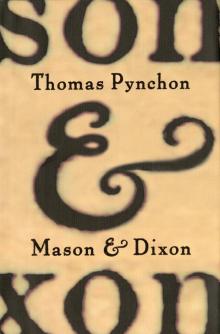 Mason & Dixon
Mason & Dixon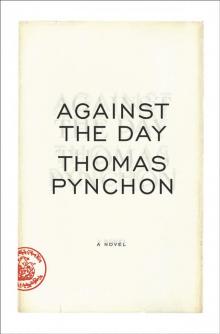 Against the Day
Against the Day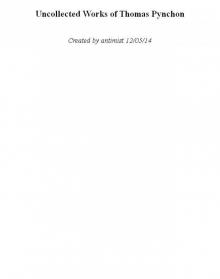 Uncollected Works
Uncollected Works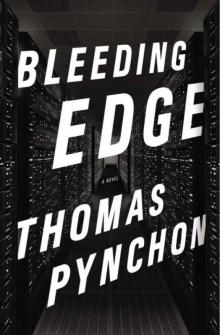 Bleeding Edge
Bleeding Edge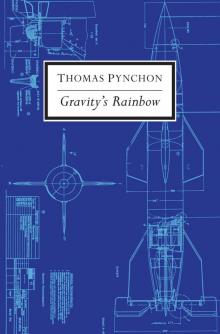 Gravity's Rainbow
Gravity's Rainbow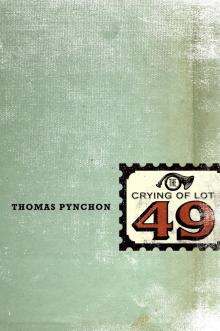 The Crying of Lot 49
The Crying of Lot 49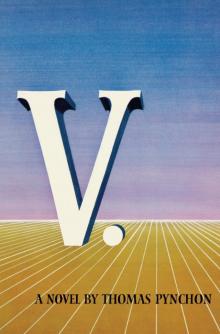 V.
V. Inherent Vice
Inherent Vice Vineland
Vineland